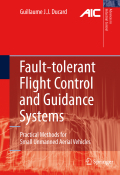
Fault-tolerant flight control and guidance systems: practical methods for small unmanned aerial vehicles
Ducard, G.
Unmanned aerial vehicles (UAVs) offer a means of gathering intelligence and carrying out missions. The benefits are considerable in terms of cost, efficiency, and reduced pilot risk. To complete a mission efficiently and with a high level of safety and security: the flight control system must be robust againstmodel uncertainties and external disturbances; an efficient fault detection and isolation system; the flight control and guidance system should be reconfigurable depending on actuator fault occurrence or aircraft damage, and able to avoid obstacles. This book addresses all of these aspects with a practical approach following three main requirements: applicability in real-time; computational efficiency; and modularity. The text provides: an overview of fault-tolerant flight control techniques; the necessary equations for the modeling of small UAVs; a complete nonlinear fault detection and isolation system based on extended Kalman filters; a nonlinear flight control and guidance system. Gives the reader a complete overview of fault-tolerant flight control techniques including modeling equations and extended Kalman filter implementation Presents a complete nonlinear flight control system with many figures and finite-state diagrams to make the use of the control algorithms as easy as possible INDICE: Introduction.- Review.- Nonlinear Aircraft Model.- Nonlinear FaultDetection and Isolation System.- Control Allocation.- Nonlinear Control Design.- Autopilot for the Longitudinal Motion.- Autopilot for the Lateral Motion.-Reconfigurable Guidance System.- Evaluation of the Reduction in Performance of a UAV.- Conclusions and Outlook.- Appendices.
- ISBN: 978-1-84882-560-4
- Editorial: Springer
- Encuadernacion: Cartoné
- Páginas: 295
- Fecha Publicación: 01/07/2009
- Nº Volúmenes: 1
- Idioma: Inglés
